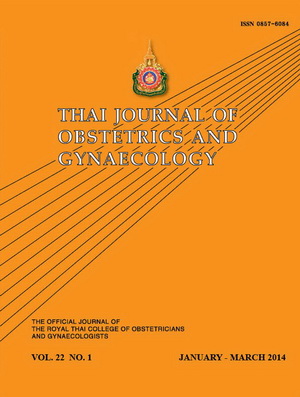Postpartum Use of Long-Acting Reversible Contraception in Primiparous Women: Ramathibodi Hospital’s Experiences
Main Article Content
Abstract
Objective: To determine desire and initiation of long-acting reversible contraception (LARC) of primiparous women in the postpartum period.
Materials and Methods: A prospective cohort study was conducted at Faculty of Medicine Ramathibodi Hospital, Bangkok, from July 2012 to December 2012. Postpartum women, who were primiparous, aged greater than or equal to 20 years and willing to participate were recruited into this study. Prior to discharge, a structured interview questionnaire was used to determine initial postpartum contraception desires. After discharge, data was collected at 8–12 weeks postpartum using telephone calls to determine postpartum contraception utilization and reasons.
Results: Five hundred and two out of 547 women had a documented postpartum visit at 8-12 weeks, giving an overall response rate of 91.8%. Amongst the 197 women (36.0%), who desired LARC prior to discharge, 161 (32.1%) utilized LARC within 8-12 weeks postpartum and the most common reason was no effect on breast-feeding. Injectable was the most common method of LARC used (55.9%). Simultaneous factor associated with desire for LARC prior to discharge and LARC utilization at 8-12 weeks postpartum was occupation. Compared to government officers, employees and housewives, business owners were more likely to desire and utilize LARC.
Conclusion: LARC is highly desired and utilized at 8-12 weeks postpartum in primiparous women. Occupation was a predictor of LARC desire and utilization. The most common reason of LARC utilization at 8-12 weeks was no effect on breast-feeding.


